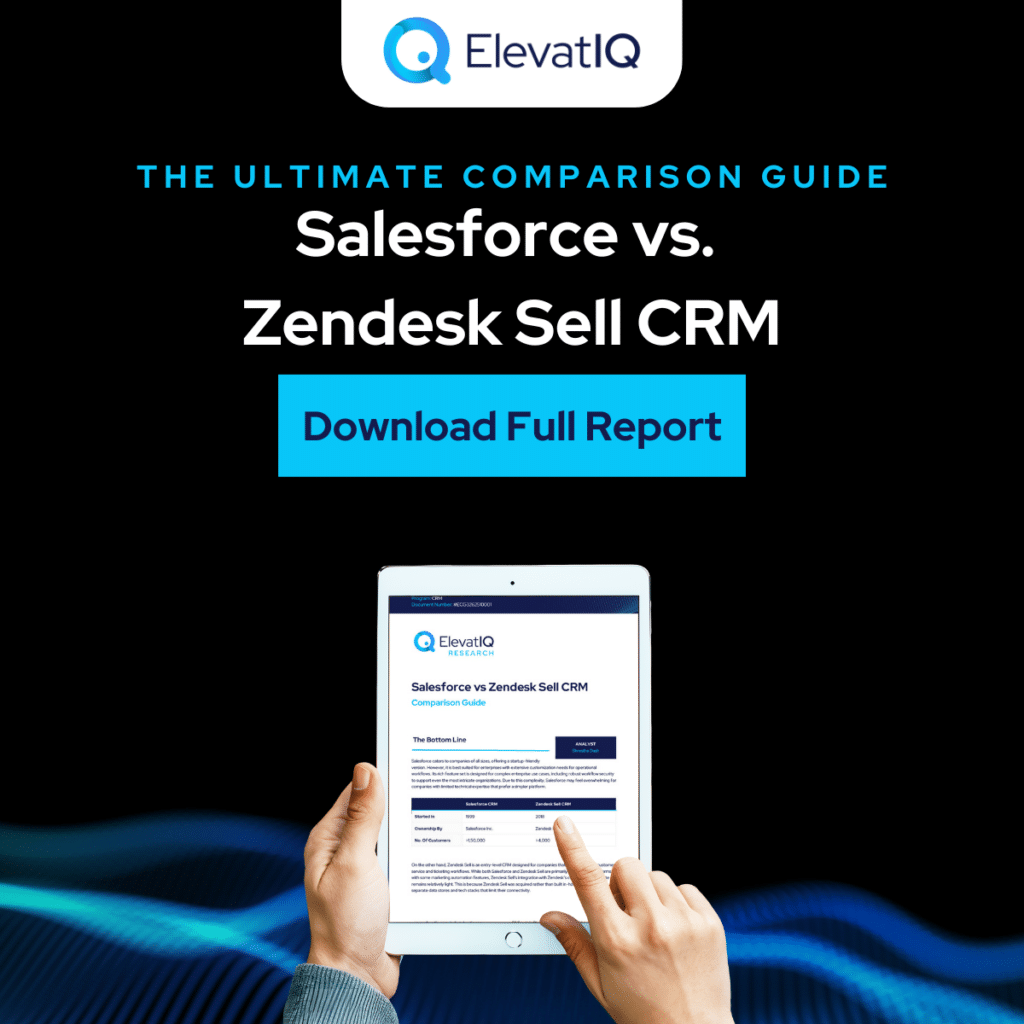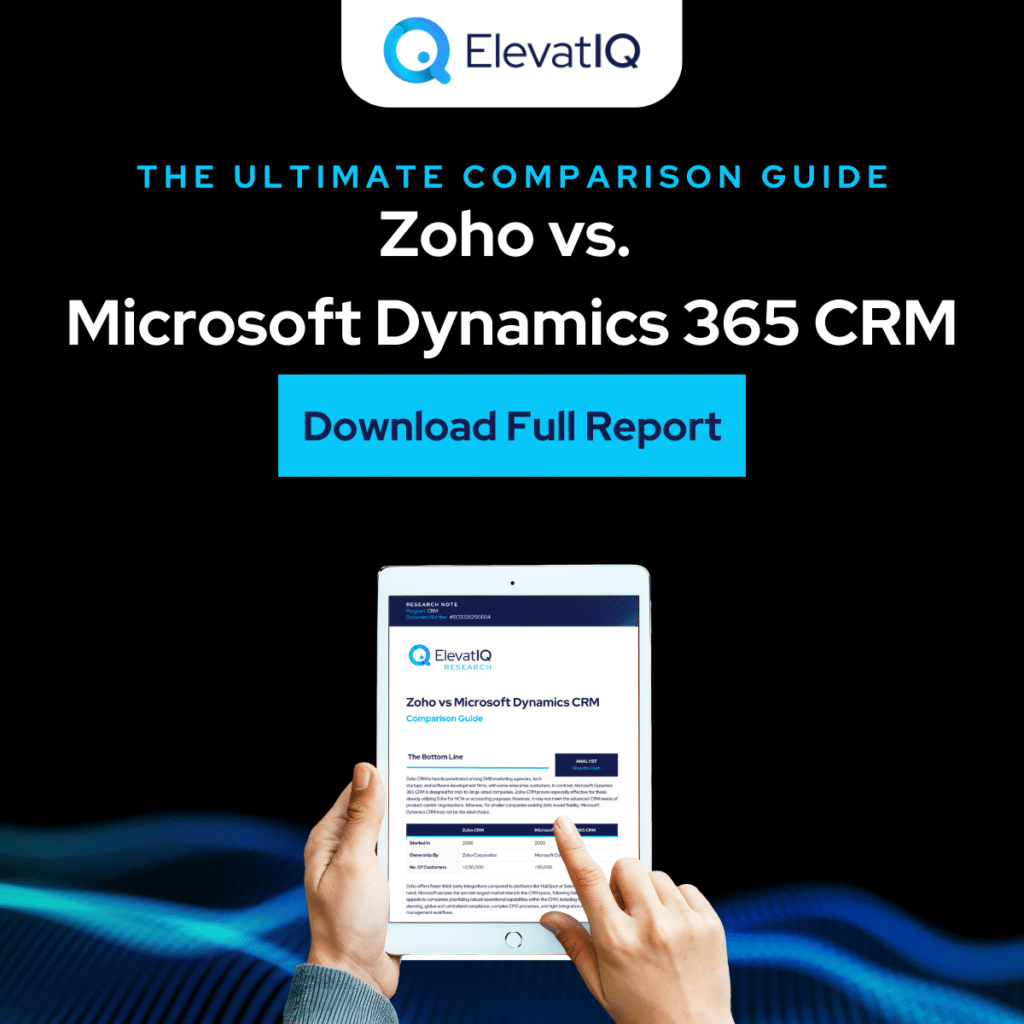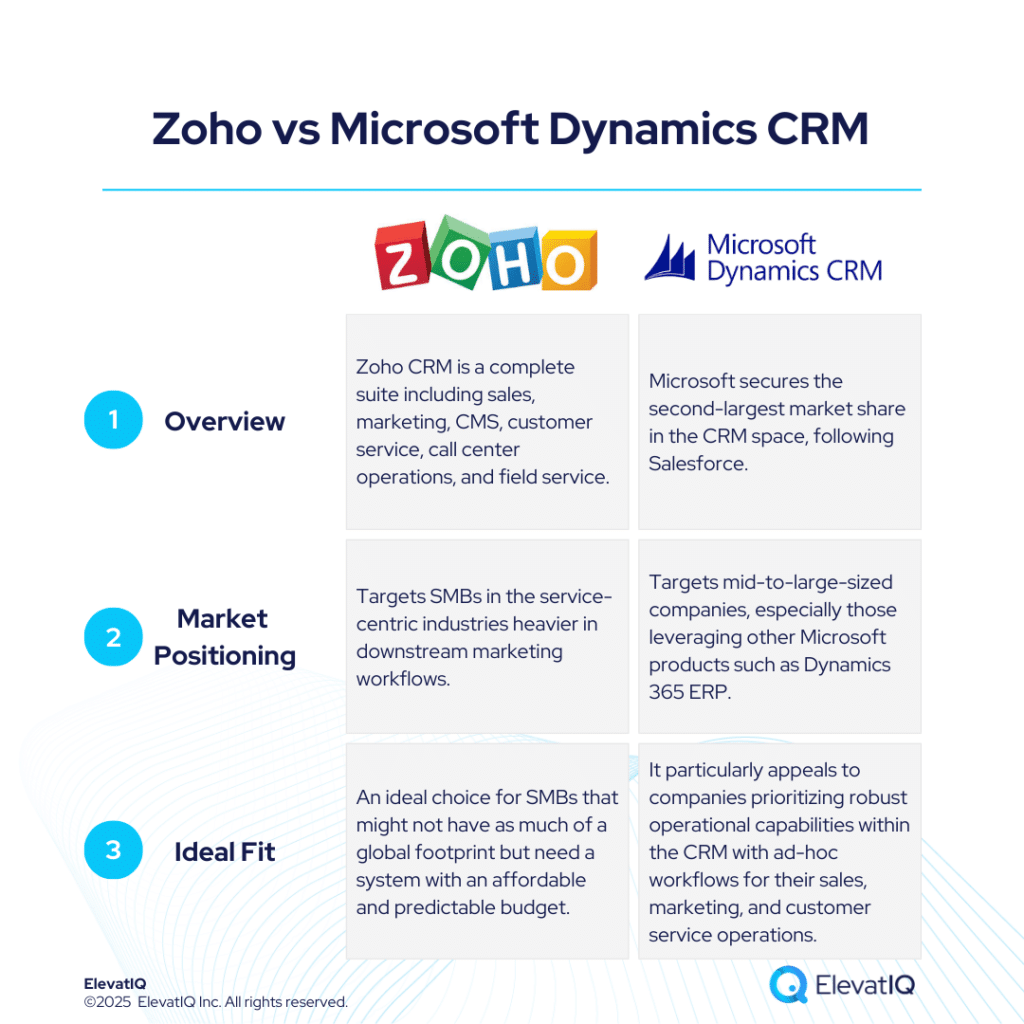Zoho CRM vs Microsoft Dynamics: Independent Review
Zoho CRM has strong adoption among SMB companies such as marketing agencies, tech startups, and software development firms. Some enterprise companies use it as well. By comparison, Microsoft Dynamics 365 CRM is built for mid-to-large-sized businesses. Zoho works especially well for organizations that use other Zoho products. However, it may not support the advanced CRM needs of product-focused companies.
Conversely, Microsoft Dynamics offers rich functionality but may not suit smaller companies with limited budgets. It stands out to companies seeking powerful operational capabilities, such as territory planning, centralized compliance, complex CPQ processes, and integrated project management. Both platforms offer a comprehensive CRM suite—Sales Cloud, Marketing Cloud, Field Service, and Customer Service. Still, their customization approaches differ.
Zoho provides a low-code/no-code customization platform, which is useful for lighter needs. It has limitations at the business object level. In contrast, Microsoft Dynamics allows full overrides of business objects. This enables advanced CX workflows, much like Salesforce. Additionally, Dynamics 365 includes an enterprise-grade Customer Insights platform, making it a strong fit for B2C companies using CDP workflows. It does offer marketing automation, but the capabilities are somewhat limited with weaker website integration compared to HubSpot’s built-in CMS.
Zoho takes a different path. It includes a CMS, but its ecosystem and integrations are less extensive than HubSpot or WordPress. Its data model is similar to Salesforce—leads are separate objects, and accounts link to contact data. In comparison, Dynamics 365 mandates some layers of product data as well. This added complexity may require input of operational and financial data that sales and marketing teams don’t always need. With that context, let’s now compare the specific strengths and limitations of Zoho CRM vs Microsoft Dynamics.
What Is Zoho CRM?
Zoho’s strategy mirrors Microsoft’s, offering a broad suite of apps across business functions. However, these apps often run on isolated data models, which can limit cross-functional insights and increase integration efforts. While Zoho’s native app ecosystem reduces the need for third-party tools, it also restricts ecosystem openness, with fewer pre-built integrations compared to platforms like Salesforce or HubSpot. This can impact scalability for businesses looking to follow a best-of-breed tech stack approach.
How important is pricing flexibility versus long-term scalability for your team? Can your organization manage DIY implementations, or is consultant support necessary? Will your marketing, sales, and IT teams benefit more from tightly integrated native tools or from deeper third-party app ecosystems? Zoho offers a compelling value proposition, especially for growing businesses—but these trade-offs must be weighed carefully. Download the ultimate Zoho CRM vs Microsoft Dynamics comparison guide for detailed insights.
What Is Microsoft Dynamics CRM?
Microsoft Dynamics 365 offers a unified CRM suite that connects deeply with its ERP systems, especially for mid-sized and enterprise businesses. Unlike other platforms, Microsoft bundles key features—like core CRM, customer insights, and service modules—into a single, tightly integrated offering. This tight connection with product and pricing data improves data consistency but also adds complexity. As a result, Dynamics 365 often demands more setup time and consulting support. By contrast, CRMs like Salesforce or HubSpot are generally easier to implement, offering faster onboarding and smoother initial experiences.
How important is native integration between your CRM and ERP systems? Do your sales and marketing teams need simplicity, or are they equipped to handle more complex, enterprise-grade tools? Can your organization support a higher implementation effort if it means gaining better long-term alignment across data and workflows? Microsoft Dynamics 365 might be the right fit if global workflows and deep customization are key. Download the ultimate Zoho CRM vs Microsoft Dynamics comparison guide now to compare how these leading platforms stack up.
Zoho vs Microsoft Dynamics CRM Overall Comparison
Zoho is known for its simplicity and affordability, making it a strong choice for SMBs. It integrates well within its own suite but may face challenges when scaling or connecting with external systems. Microsoft Dynamics, on the other hand, is built for complexity. It handles global workflows, territory planning, and compliance with ease. However, that power comes with a steeper learning curve and often requires consulting support. Each platform takes a different approach to CRM features, data models, and integration depth.
Are you focused on fast deployment and tight cost control? Or do you need a platform that can support long-term global growth? Do you prioritize seamless integration across internal tools—or openness to a broader ecosystem? Can your team manage complex customizations, or would you rather keep things simple? Download the ultimate Zoho CRM vs Microsoft Dynamics comparison guide now to dive deeper.

Zoho vs Microsoft Dynamics CRM Module Comparison
Both Zoho and Microsoft Dynamics CRM come packed with features aimed at different market segments. This comparison highlights the key differences between the two platforms across several important areas. In the sections that follow, we break down capabilities across core modules—specifically marketing, sales, customer service, and e-commerce.
Marketing
Zoho and Microsoft Dynamics CRM both offer a range of marketing capabilities, but they take different approaches. Zoho leans on its broader ecosystem with apps like Zoho Campaigns and Zoho Social to support content, email, and social media marketing. While it doesn’t have a built-in content creation module, tools like Zoho Writer and PageSense help fill that gap. Microsoft Dynamics CRM, on the other hand, offers stronger native integration with reusable content blocks and tighter control over metadata and SEO elements. It also supports centralized social media management and email marketing, though some features may require additional setup.
What matters more to your team—integrated tools within one ecosystem or deeper built-in capabilities? Do you rely heavily on SEO and social campaigns, or are email workflows your priority? How much control do you need over content reuse and personalization? Thinking through these questions can help you align platform strengths with your marketing goals. Download the ultimate Zoho CRM vs Microsoft Dynamics comparison guide now to explore these differences in depth.
Sales
Zoho and Microsoft Dynamics CRM both offer solid capabilities to support sales teams. Zoho provides an easy-to-use pipeline view, email tracking, and scheduling features, along with real-time chat for collaboration. Its tools are well-suited for small to mid-sized businesses looking for quick setup and flexibility. Microsoft Dynamics CRM, while offering similar features, is more tailored for complex sales operations. Its lead management and collaboration tools are built to support larger teams with more structured workflows and data-driven decision-making.
What kind of sales process does your team follow—simple and fast-moving, or complex and layered? Do your reps need real-time communication tools, or deeper data insights to close deals? How important is it to have built-in scheduling and email analytics? These questions can guide your evaluation. For a closer look at how each platform aligns with your sales goals, download the ultimate Zoho CRM vs Microsoft Dynamics comparison guide now.
Customer Service
Zoho supports real-time communication through tools like Zoho Desk and SalesIQ, along with ticketing, automation, and omni-channel support. It’s a solid fit for growing teams that want customizable workflows without too much complexity. Microsoft Dynamics CRM, on the other hand, brings enterprise-grade service tools. Its robust ticketing system, live chat, and self-service portal make it ideal for larger teams needing structured, automated support processes.
Does your team prioritize ease of use or deep automation? How important is omni-channel support for your customer experience goals? Are you looking for an integrated self-service portal or real-time help options? Answering these can clarify which CRM aligns best with your support needs. For a more detailed breakdown, download the ultimate Zoho CRM vs Microsoft Dynamics comparison guide now.

E-commerce
Zoho provides tools for product catalog creation and integrates with Zoho Inventory for order processing. It also supports personalized experiences by connecting with other Zoho apps. Microsoft Dynamics CRM takes a more integrated approach with its ecosystem. It connects seamlessly with Dynamics 365 Supply Chain Management and offers advanced personalization features, including customer segmentation and tailored recommendations.
Are you looking for simple catalog tools or deep integration with supply chain systems? How important is personalization in your customer experience strategy? Do you need built-in segmentation and insights, or is basic integration enough? These questions can help guide your CRM selection. For a deeper dive into these capabilities, download the ultimate Zoho CRM vs Microsoft Dynamics comparison guide now.
Zoho vs Microsoft Dynamics CRM Pros
Zoho stands out with its built-in workflow builder and Zoho Creator, which makes it easy to build custom apps without third-party tools. Microsoft Dynamics CRM, on the other hand, is tailored for larger enterprises with complex structures. It supports advanced business objects, uses a shared data model, and integrates tightly with Microsoft’s broader ecosystem. It’s especially strong in CPQ, territory planning, and global compensation processes.
Are you looking for a platform that enables fast customization without heavy development? Or do you need deeper enterprise features with robust data modeling? Is integration across Microsoft apps a key part of your strategy? These are essential questions when comparing the two. For a detailed breakdown of how each platform aligns with your goals, download the ultimate Zoho CRM vs Microsoft Dynamics comparison guide now.
Zoho vs Microsoft Dynamics CRM Cons
Zoho and Microsoft Dynamics CRM each come with their own set of limitations. For instance, Zoho may fall short in areas like territory management and pre-built integration outside its ecosystem. Its closed ecosystem can also limit flexibility when working with third-party tools. Meanwhile, Microsoft Dynamics offers deep capabilities but may pose usability challenges. Its tightly connected data and process models often require external consulting to implement effectively. Importing data can also be less intuitive, especially for sales teams working across systems.
Are you prepared to manage Zoho’s limited integration options? Or will Microsoft’s complexity add overhead to your team’s workflows? Does your business need open connectivity or tighter control with internal systems? Weighing these considerations is essential. For a clearer view of how each platform stacks up, download the ultimate Zoho CRM vs Microsoft Dynamics comparison guide now.
Download the Full Research Report

Zoho CRM vs Microsoft Dynamics: Independent Review Read More »


